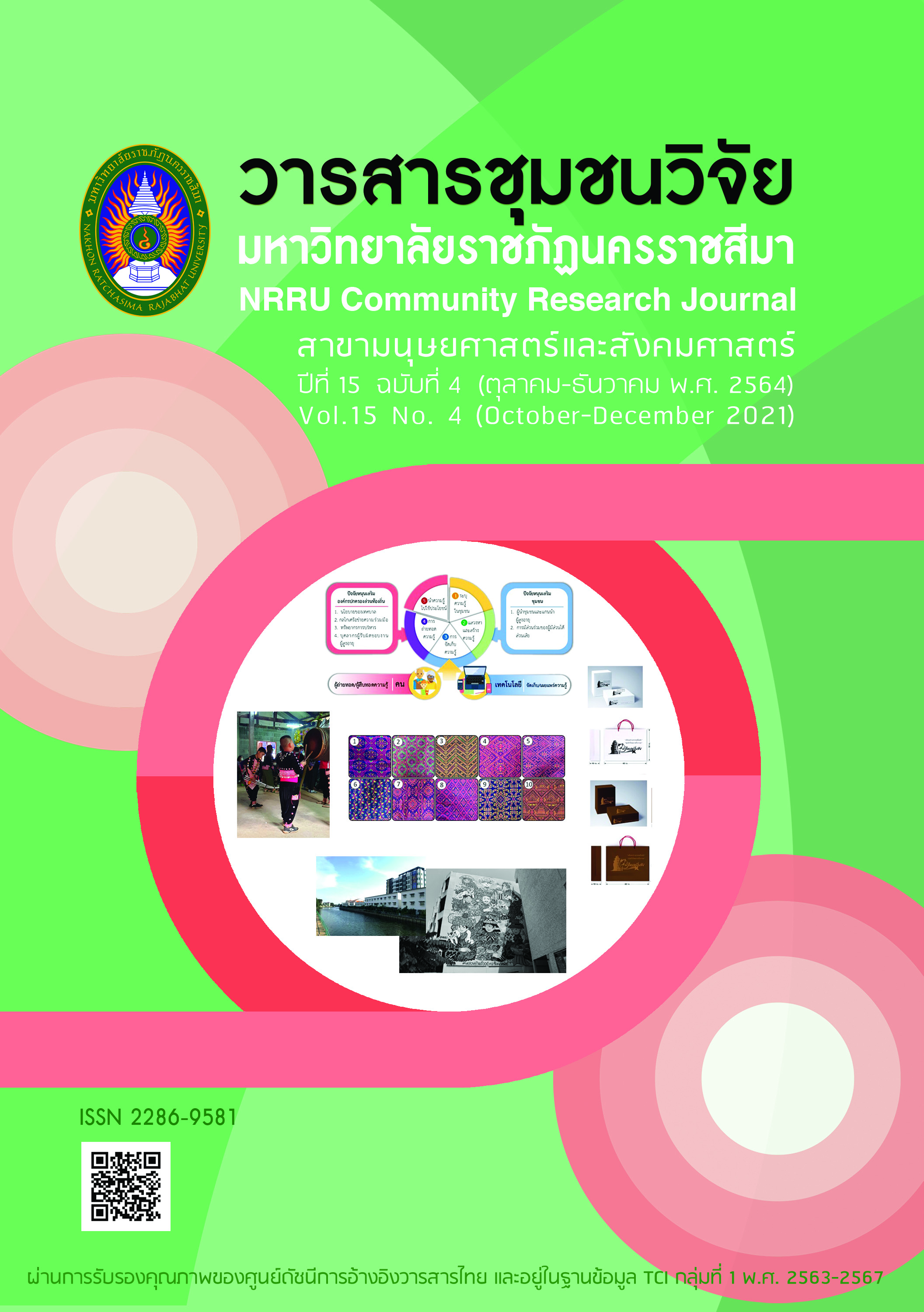DEVELOPMENT OF TEACHER COMPETENCY PROGRAM IN THE 21ST CENTURY LEARNING ASSESSMENT AND EVALUATION FOR EDUCATIONAL INSTITUTES UNDER THE NORTHEAST VOCATIONAL EDUCATION INSTITUTION
DOI:
https://doi.org/10.14456/nrru-rdi.2021.73Keywords:
Developing program, Teachers’ competency, Assessment and evaluation, 21st centuryAbstract
Changing the teachers’ learning roles in following the changes in the 21st century requires an appropriate development program. This led to the research objectives which were to study the components and indicators, current conditions, expected conditions, and needs, together with to develop a program and study the effect of using the teacher competency program in learning assessment and evaluation for educational institutions, under the Northeastern Vocational Institution. The sample used a specific selection method, consisting of 412 teachers and 12 experts. The research instruments were interview forms, assessment forms, tests, and questionnaires, which passed quality checks by experts. Data were collected by field trips, interview field, a pilot study to evaluate the program, and statistics were used to analyze the data were percentage, mean, standard deviation, and PNI. The research results were as follows: 1) 3 components and 20 indicators of teacher competency in LAE, 2) the current state of teacher competency in LAE outcomes at a high level and expected conditions of teachers' competency in LAE outcomes was at the highest level. In addition, the essential needs index consisted of skills, knowledge, and attributes, respectively, 3) 8 parts teacher competency in LAE, which were background and importance, objectives, forms and methods of reinforcement, structure, content, activities guidelines, techniques and tools, and evaluation, lastly 4) the results of using the teacher competency enhancement program in LAE showed that teachers' knowledge increased by 21.90 percent, competence increased by 35.40 percent, and teachers were satisfied with the supplementation at the highest level.
References
Barr, M. J., & Keating, L. A. (1990). Developing Effective Student Service Program: Systematic Approaches for Practitioners. San Francisco, CA : Jossey Bass.
Barratt, C. (2013). How to Develop a Training Program on the Job. Retrieved February 11, 2019, from http://www.wikihow.com/Develop-a-Training-Program-on-the-Jop
Best, J. W. (1977). Research in Education (3rd ed.). New Jersey : Prentice Hall.
Civil Service Development Institute. (2010). Performance Competency Guide in Civil Service : Specific Competency Manual According to the work Behavior. Office of System Development, Classification and Compensation, Nonthaburi, Office of the Civil Service Commission. (In Thai)
Institute of Vocational Education Northeastern 3. (2018). Self Assessment Report. Mahasakham : n.p. (In Thai)
Kanaya, T., & McMillan., C. (2005). Facilitating Communities of Practice in Teacher Professional Development. Denmark : eLearning Lab, Aalborg University.
Khammanee, T. (2017). Pedagogical of Teaching : Body of Knowledge for Learning Process Efficiency (21th ed.). Bangkok : Chulalongkorn University Press. (In Thai)
Ministry of Education. (2002). National Education Act, B.E.2545 (2002). Bangkok : Organization for the Delivery of Goods and Parcels. (In Thai)
Ministry of Education. (2011). Education Quality Assurance. Bangkok : Teachers Council of Thailand, Ladprao. (In Thai)
Mitchell, C., & Sackney, L. (2001). Profound improvement: Building capacity for a learning community. Lisse, The Netherlands : Swets & Zeitlinger.
Noinon, P. (2016). A Development of the 21st Century Learning Assessment Model for Science in Mathayomsuksa 4. Thesis, Doctor of Education Program in Education Research and Evaluation, Mahasarakham University, Mahasarakham. (In Thai)
Phanich, V. (2012). Method of Learning in 21st Century. Bangkok : Sodsri Foundation. (In Thai)
Poonputta, A. (2017). The Development Educational Measurement and Evaluation Competency Model of Internship Students in Teaching Profession : Rajabhat Mahasarakham University. Thesis, Doctor of Education Program in Educational Administration and Development, Mahasarakham University, Mahasarakham. (In Thai)
Saisunanthararom, S. (2018). Developing a Program to Strengthen Teacher Competencies on Authentic Assessment of School under Secondary Educational Service Area Office 32. Thesis, Master of Education Program in Educational Administration and Development, Mahasarakham University, Mahasarakham. (In Thai)
Sakworawit, A. (2004). Competency : Misconception. Journal of Chulalongkorn, 16(64), 35-78. (In Thai)
Scriven, M. (1995). A Unified Theory to Teacher Evaluation. Studies in Education Evaluation, 21(1), 111-129.
Secretariat of the Teacher Council of Thailand. (2005). Professional Standard of Education. Bangkok : Secretariat of the Teacher Council of Thailand. (In Thai)
Smithikrai, C. (2009). Recruitment, Selection, and Performance Appriasal. Bangkok : We print. (In Thai)
Sullivan, R., & McIntosh, N. (1996). The Competency Based Approach to Training. Maryland : JHPIEGO Corporation.
Tangkitvanich, S. (2013). Basic Education Reform for Learning in 21st Century. Bangkok : National Statistical Office. (In Thai)
Toole, J. C., & Louis, K. S. (2002). The Role of professional learning communities in international education. In K. Leithwood, & P. Hallinger (Eds.), Second International Handbook of Educational Leadership and Administration. The Netherlands : Kluwer Academic.
Wisalaporn, S. (2002). The Model of Connection to Develop Teacher and Educational Personnel under Education Act 1999. Research Report. Office of the National Education Commission, Bangkok. (In Thai)
Wongwanich, S. (2007). Need Assessment Research (2th ed.). Bangkok : Chulalongkorn University Press. (In Thai)
Wongyai, W., & Patphon, M. (2014). Coaching for Meta Cognition. Bangkok : Charansanitwong Press. (In Thai)





